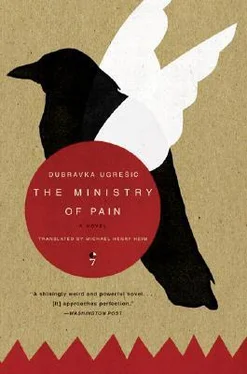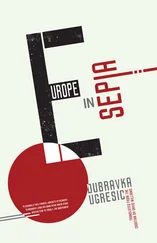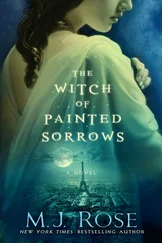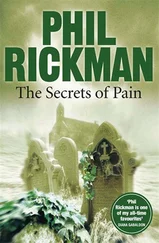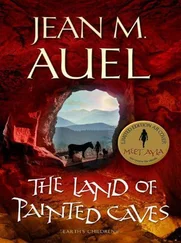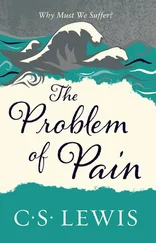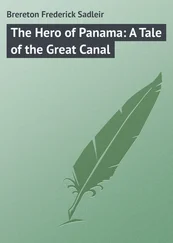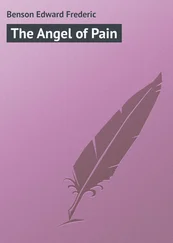As far as the Hague Tribunal is concerned, the files are piling up, the mounds of paper growing; the videotapes of the proceedings could cover the length and breadth of the land that is no longer. Every loss seems to have been taken care of in real, ironic, or grotesque terms — yet taken care of nonetheless. Wounds have healed properly for some, poorly for others — yet healed they have. Even the scars are fading. Everyone is somewhere, some doing what they do best, others doing the best they can. Life has dealt better cards to some than others, but everyone has found some kind of niche. The dead and disappeared have yet to be counted, many of the perpetrators are still at large, much rubble has yet to be cleared, many mines defused, but the dust has settled. Life goes on and for the present at least is good to everyone.
One day the Tribunal will land the biggest culprit of them all, and I will go have a look at him. He will be wearing a gray suit, white shirt, and bright red tie. The color of the tie will be identical to that of a judge’s robe. The defendant will sit in his glass cage, his jaw clenched and his mouth in the shape of an upside-down U. The clock will show the time, but it will not be the time of the world outside the courtroom. I will be shocked to discover that in the few intervening years I have forgotten everything, that I can scarcely bring up the names of the people who so played with our lives. I will have the feeling it is a hundred years since the war broke out, not nine or ten. I will confront my forgetting head on and with a profound sense of horror. The man in the red tie will speak a language I no longer understand. I will remember even the following detail: leafing through the papers in front of him, the accused will lick his fingers like a village shopkeeper; he will raise his head, as if to sniff the air around him, and squint into the courtroom; at that moment the eyes behind the glass and mine will meet; the eyes will be dark, dull, void of expression; his tightly clenched jaw and dull stare will remind me of a polar bear; then he will lift his paw, brush the invisible flies away from his nose, and go back to staring blankly in front of him.
Sometimes I think of Uroš and think he made the right choice. He took along his pencils and pads and velvet yarmulkes, one for each day of the week. He brushes his teeth and, circumstances permitting, turns to face the sacred Kotel ha-Ma’aravi wall. Sweating like an accountant, he writes out his grievances and prayers on scraps of paper, which he rolls into small tubes, and stuffs them into the cracks between the blocks of stone.
We’ve come out of everything we went through in one of three ways, says Igor: The better for it, the worse for it, or, like Uroš, with a bullet in the skull. I don’t know where I stand, except that I managed to dodge the bullet.
And speaking of Igor, I didn’t let on to Darko that I knew more about his circumstances than what he’d told me that day on the beach. For one thing, the statement I gave to the police never reached him. The cop who came to my place must have felt he’d done enough for me by removing the handcuffs. And right he was, too. I underestimated his acumen.
Igor is currently working with some Irish builders. The Irish are good with their hands, skilled carpenters. They renovate houses and flats: tear down walls and build them up again, lug out all the junk that has piled up over the years — do whatever is called for. Not that Amsterdam isn’t full of “our people,” but Igor steers clear of them. Igor has taken to this hard manual labor quite recently. He puts everything he’s got into it, as if it were a penance of sorts. Maybe he’s driven by the insane notion that by the sweat of his brow he is restoring a certain equilibrium, that for every wall he builds here one will rise out of the ruins there, in the villages of Bosnia or Croatia or wherever it may be needed.
Life has been good to us. Igor leaves early and comes home early. He heads straight for the shower, washes off the dirt, puts on clean clothes, rolls up his shirtsleeves, and takes his seat at the table. I serve a freshly prepared meal. We eat slowly and, oddly enough, speak little. Our words are as dry as sand. I like their dryness. Maybe we’re becoming Dutch. The Dutch are said to speak only when they have something to say.
After dinner I curl up next to him, breathe in his smell, breathe through his skin like a fish through its gills. I set my pulse to his, I course through his veins. I pull back for an instant to look at him, as if unable to believe he’s here…I notice a smudge of paint left on his cheek and lick at it, remove it with my saliva. I pull at his lip with my teeth, push my tongue into his mouth and suck out the oxygen crucial to my survival, then deliver the oxygen crucial to his. We both feel an intoxicating blast as the present invades our every last vein, and for a time we inhale the pure extract of nothing to remember and nothing to forget.
Occasionally my angst gains the upper hand. When it does, I grab my bag, fling a coat over my shoulders, and race out of the apartment. Igor has stopped offering to go with me; he leaves me to my own devices, knowing where I’m off to. It’s usually the seaside, one of those long sandy beaches. I love the deserted Dutch beaches in late autumn and winter. I stand there gazing at the gray sea and gray sky, stand there riveted, facing an imaginary wall. Then I open my mouth and let out the words, slowly at first, then faster, faster and louder. I flicker my tongue like a fairy tale dragon, and it forks into Croatian, Serbian, Bosnian, Slovenian, Macedonian…. Facing the invisible wall, I thrust my head rhythmically into the wind and speak. I do not believe in God; I know no prayer. Enveloped in the wind, imprinted onto the landscape as into a lantern-slide panorama, I, the Teacher, the pride of my generation, speak what I have to speak, speak my Balkan litany. I shatter the glass with my voice like Oskar Matzerath. I secrete the words from my mouth like ink from a cuttlefish. I post my sounds to the nameless like a message in a bottle. Having cast them to the winds, I see them flying through the air. I watch them curl into tiny tubes, loop the loop and nosedive into the wall of water, where they dissolve instantly, like Alka-Seltzer.
May you be cursed in this world and the next.
May you not live to see the sun rise.
May the vultures get you.
May you vanish from the earth.
May you walk a thorn field barefoot.
May God make you thinner than a thread and blacker than a pot.
May you reap wormwood where you sow basil.
May the Devil torment you.
May the Devil lap your soup.
May ravens caw at you.
May thunder and lightning strike you.
May lightning strike you and split you down the middle.
May you wander blind over the earth.
May a serpent bite you in the heart.
May you suffer like a worm under bark.
May your heart quarter and burst.
May you never more see the light of day.
May all abandon you.
May you lose all but your name.
May your seed be obliterated.
May your life be bleak and barren.
May a serpent wind round your waist.
May a serpent swallow you whole.
May the sun burn you alive.
May your sugar be bitter.
May you choke on bread and salt.
May the sea cast up your bones.
May grass sprout through your bones.
May you turn to dust and ashes.
May your mouth utter never a word.
May you be damned.
May a live wound devour you.
May the waters close up over you.
May your name be forgotten.
May you never see the sun.
May you rust over.
May you be murdered every day of the year.
May your roots dry up.
May you lick ashes.
May your heart turn to stone.
Читать дальше
